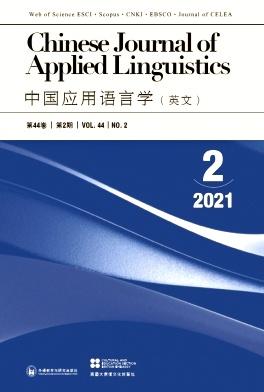Study of High-Proficiency Chinese EFL Learners’ Strategy Applications in Constructive Feedback
IF 1.1
4区 教育学
Q3 EDUCATION & EDUCATIONAL RESEARCH
引用次数: 0
Abstract
Abstract In cross-cultural and interlanguage pragmatics, constructive feedback (CF), defined as “the identification of a problematic action and advice on how to change or correct the problem” (Nguyen & Basturkmen, 2010, p. 125), has received little attention. To fill this gap, similarities and differences between native Chinese speakers, native American speakers, and high-proficiency Chinese EFL learners’ CF are explored in this study. In particular, how these learners’ strategy applications in CF differ from those of American and Chinese speakers is examined. Data were collected through discourse completion tests (DCTs) owing to their advantages in controlling social variables and their efficiency in eliciting rich data within a limited time (Leech, 2014). In total, 42 participants were randomly selected from three groups: 14 native Chinese speakers, 14 native American speakers, and 14 high-proficiency Chinese EFL learners. The results revealed significant differences in strategy employment in CF among the three groups, with the highest disparity elicited in hedge strategies. Here, EFL learners resembled American speakers in six of the eight hedge strategies. However, they had the same percentage in terms of compliments as the Chinese speakers. With regard to supportive moves, there were no significant differences among the three groups. As a pioneering investigation, the aim of this study is to call for further research on CF.中国高水平英语学习者策略在建构性反馈中的应用研究
在跨文化和语际语用学中,建设性反馈(CF)被定义为“识别有问题的行为,并就如何改变或纠正问题提出建议”(Nguyen & Basturkmen, 2010, p. 125),很少受到关注。为了填补这一空白,本研究探讨了中国母语人士、美国母语人士和中国高水平英语学习者的CF的异同。特别研究了这些学习者在语言交际中的策略运用与美国和中国学习者的差异。由于话语完成测试(dct)在控制社会变量方面的优势以及在有限时间内获得丰富数据的效率,因此通过话语完成测试(dct)收集数据(Leech, 2014)。总共42名参与者被随机从三组中选择:14名母语为汉语的人,14名母语为美国人,14名高水平的中国英语学习者。结果显示,三组学生在财务管理策略使用上存在显著差异,其中对冲策略差异最大。在这里,英语学习者在八种对冲策略中的六种与美国人相似。然而,在赞美方面,他们和说中文的人的比例是一样的。在支持措施方面,三组之间没有显著差异。作为一项开创性的研究,本研究的目的是呼吁对CF的进一步研究。
本文章由计算机程序翻译,如有差异,请以英文原文为准。
求助全文
约1分钟内获得全文
求助全文
来源期刊

Chinese Journal of Applied Linguistics
EDUCATION & EDUCATIONAL RESEARCH-
CiteScore
1.50
自引率
0.00%
发文量
377
期刊介绍:
The Chinese Journal of Applied Linguistics (CJAL) (formerly known as Teaching English in China – CELEA Journal) was created in 1978 as a newsletter by the British Council, Beijing. It is the affiliated journal of the China English Language Education Association (founded in 1981 and now the Chinese affiliate of AILA [International Association of Applied Linguistics]). The Chinese Journal of Applied Linguistics is the only English language teaching (ELT) journal in China that is published in English, serving as a window to Chinese reform on ELT for professionals in China and around the world. The journal is internationally focused, fully refereed, and its articles address a wide variety of topics in Chinese applied linguistics which include – but also reach beyond – the topics of language education and second language acquisition.
 求助内容:
求助内容: 应助结果提醒方式:
应助结果提醒方式:


